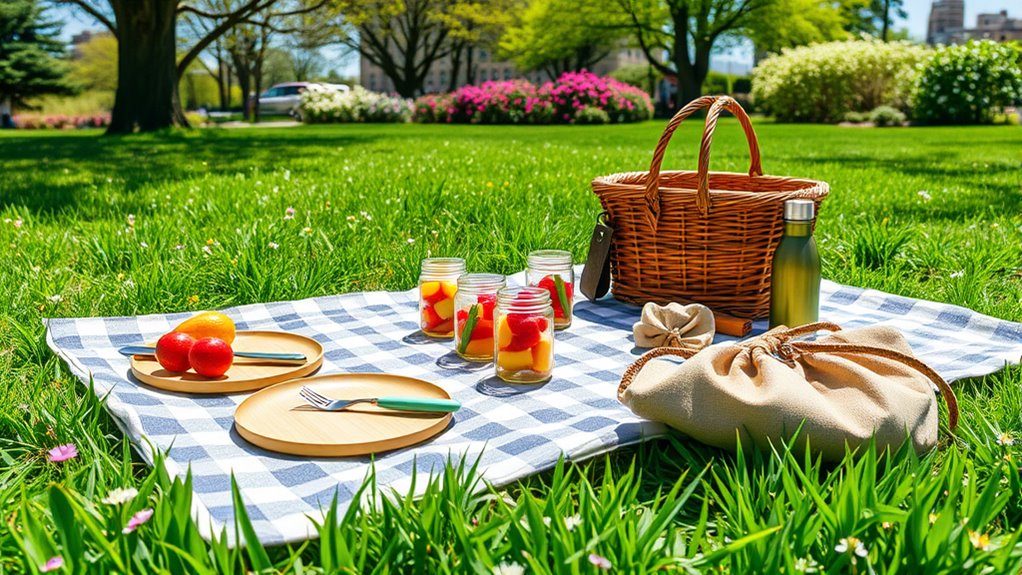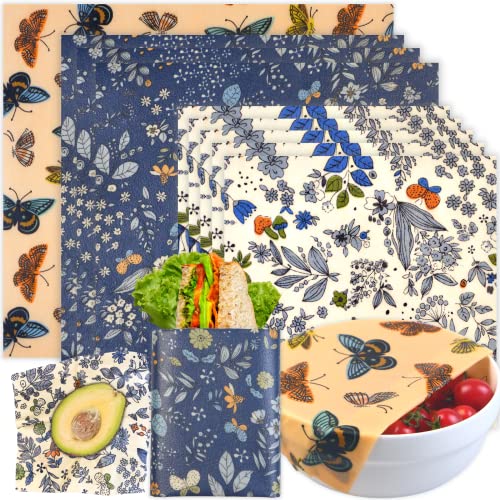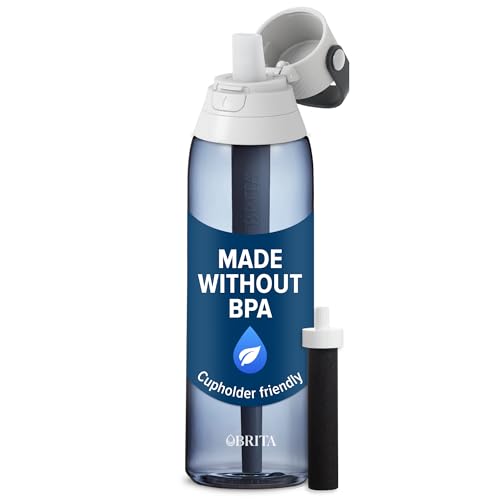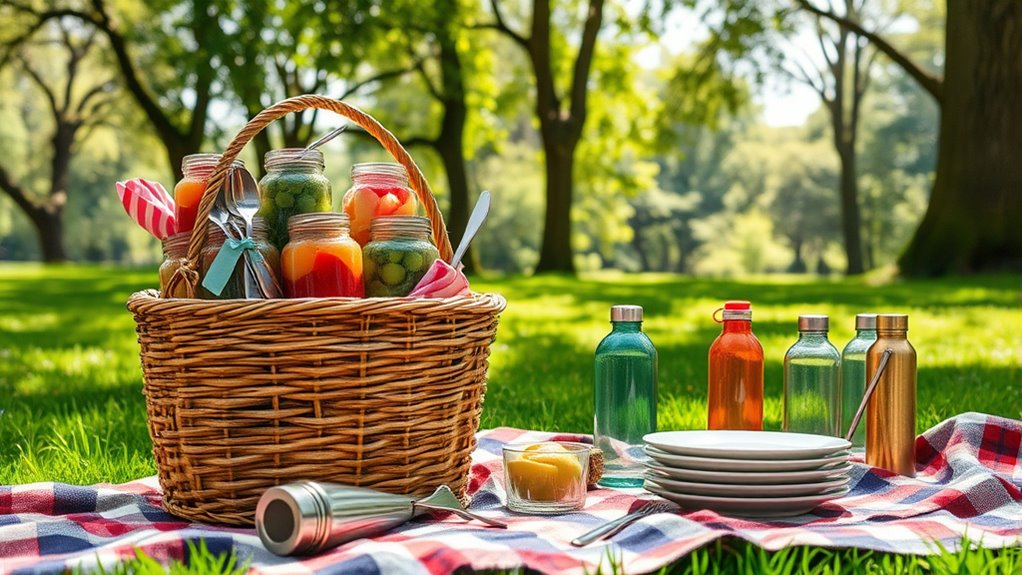To plan a waste-free picnic, choose reusable containers, utensils, and eco-friendly wraps instead of single-use plastics. Opt for locally sourced, organic foods and prepare homemade snacks to cut down on packaging waste. Bring a reusable water bottle and plan to compost or recycle leftovers responsibly. Keep your setup simple and mindful, making sure to take all waste with you. Want tips on organizing the perfect eco-friendly picnic? Keep exploring for more ideas.
Key Takeaways
- Use reusable containers, utensils, and cloth napkins to minimize single-use plastics and waste.
- Choose locally sourced, organic, and seasonal foods prepared at home to reduce packaging and food waste.
- Pack snacks in bulk or reusable containers, and bring a water bottle with a filter to avoid disposable bottles.
- Bring a small compost bag for organic waste and separate recyclables for proper disposal.
- Plan activities and setup to eliminate unnecessary packaging, ensuring cleanup leaves the environment pristine.

Planning a waste-free picnic is easier than you might think and a great way to enjoy the outdoors responsibly. The key is to focus on eco-friendly packaging and sustainable food choices that reduce waste and minimize your environmental impact. Start by selecting reusable containers, such as glass or stainless steel, instead of plastic wrap or single-use bags. These durable options not only keep your food fresh but also eliminate the need for disposable packaging. Bring along cloth napkins and utensils, which can be washed and reused, avoiding the landfill clutter caused by paper towels and plastic cutlery. When packing snacks and meals, consider using beeswax wraps or silicone food covers that are flexible, washable, and eco-friendly alternatives to plastic wraps. These small changes make a significant difference in cutting down on waste and help you stick to a more sustainable approach.
Choosing sustainable food options is equally important. Opt for locally sourced, organic produce whenever possible, as it tends to have a lower carbon footprint compared to conventionally grown foods. Prepare homemade dishes that incorporate seasonal ingredients; these are not only fresher but also reduce reliance on packaged, processed foods. If you’re buying snacks, look for items sold in bulk to minimize packaging waste, or bring your own containers to fill at the store. Pack a variety of plant-based options, like veggie sticks, hummus, or fruit, which generally require less packaging and are more environmentally friendly. Remember to bring a reusable water bottle and a portable filtration device if needed, instead of disposable plastic bottles. This encourages hydration without creating unnecessary waste.
Additionally, being mindful of anime movies or other entertainment options while outdoors can enhance your experience without increasing waste, such as by using digital downloads instead of physical discs. As you assemble your picnic, plan ahead to minimize leftovers and waste. Use a sturdy picnic basket or bag to carry everything neatly, avoiding the need for disposable bags or wrappers. Think about your trash and recycling needs before heading out: bring a small bag for compostable waste, like fruit peels, and separate recyclables from trash. When you arrive at your spot, set up your eco-conscious picnic, ensuring all packaging is biodegradable or reusable. Afterward, clean your containers and utensils thoroughly, and take all waste with you to dispose of responsibly. By paying attention to eco-friendly packaging and sustainable food choices, you’re not only enjoying a delicious meal but also protecting the environment, making your picnic a truly guilt-free outdoor experience.

Munchpods Reusable Snack Containers with Lids 20Pcs, Portion control containers, Snack Pack Containers,2 Double Compartment Snack Containers for Kids On the Go Meals, Camping Condiment Snack Tray Prep
2 COMPARTMENT SNACK CONTAINERS : Munchpods have two separate compartments to store different foods, keep them fresh and…
As an affiliate, we earn on qualifying purchases.
As an affiliate, we earn on qualifying purchases.
Frequently Asked Questions
How Do I Choose Eco-Friendly Picnic Accessories?
Choosing eco-friendly picnic accessories means you should opt for reusable containers instead of single-use plastics. Look for biodegradable napkins made from sustainable materials to reduce waste. You can also pick stainless steel or bamboo utensils that last longer and are easier to clean. By selecting these eco-conscious options, you help protect the environment while enjoying your picnic. Remember, small choices make a big difference in creating a waste-free experience.
What Are Creative Waste-Free Snack Ideas?
You can get creative with waste-free snack ideas by using reusable containers to pack fresh fruit, veggie sticks, or homemade trail mix. Opt for snacks in eco-friendly packaging, like beeswax wraps or glass jars, to reduce waste. Consider making wraps with whole grain tortillas or using silicone snack bags for chips and nuts. These ideas keep your snacks tasty and waste minimal, making your picnic both fun and eco-conscious.
How Can I Reduce Plastic Waste During Cleanup?
To reduce plastic waste during cleanup, you should set up recycling stations and clearly label them for plastics, cans, and bottles. Bring reusable bags and containers to minimize trash. Follow composting tips by collecting food scraps separately and disposing of them in compost bins if available. Encourage everyone to participate in cleanup, ensuring waste is sorted properly. This approach helps cut down on plastic waste and promotes eco-friendly habits.
Are There Sustainable Alternatives to Disposable Utensils?
Thinking about sustainable alternatives to disposable utensils is like planting seeds for a greener future. You can opt for compostable utensils that break down naturally, or choose reusable cutlery to cut down waste altogether. These options not only reduce your environmental footprint but also make your picnic more eco-friendly. By making mindful choices, you turn your outdoor gathering into a celebration of sustainability and respect for the planet.
How Do I Encourage Others to Join Waste-Free Picnics?
You can encourage others to join waste-free picnics by sharing the benefits of recycling initiatives and eco-conscious transportation. Highlight how these practices reduce waste and carbon footprints, making the picnic more sustainable. Invite friends to bring reusable utensils and containers, and suggest carpooling or biking to the venue. Your enthusiasm and commitment will inspire others to participate, creating a fun, eco-friendly experience everyone can enjoy.
![BIOCEAN 100%Compostable No Plastic Knives Disposable Forks Spoons Plastic Utensils, The Heavyweight Heavy Duty Flatware is Eco Friendly Products for Lounge Party Wedding BBQ Picnic Camping [150 Count]](https://m.media-amazon.com/images/I/41VdQneQsfL._SL500_.jpg)
BIOCEAN 100%Compostable No Plastic Knives Disposable Forks Spoons Plastic Utensils, The Heavyweight Heavy Duty Flatware is Eco Friendly Products for Lounge Party Wedding BBQ Picnic Camping [150 Count]
【✔️PLASIC-FREE/BPI CERTIFIED 100% COMPOSTABLE】No plastic cutlery is made of all natural Corn made. No plastic silverware set ensuring…
As an affiliate, we earn on qualifying purchases.
As an affiliate, we earn on qualifying purchases.
Conclusion
Planning a waste-free picnic is simple and rewarding, even if you think it takes extra effort. Just start small—bring reusable containers and skip single-use plastics. Remember, every little step counts toward protecting our planet. You might worry it’s inconvenient, but with a little preparation, it becomes part of the fun. Enjoy your eco-friendly day outdoors, knowing you’re making a positive impact. After all, a greener picnic experience benefits everyone, including future generations.

Reusable Beeswax Wrap – 9 Pack Beeswax Wraps for Food, Eco-Friendly Beeswax Food Wraps, Bread Sandwich Wrapper – Organic, Sustainable, Zero Waste, Reusable Plastic-Free Food Storage Wrap, 1XL, 3M, 5S
【NATURAL ECO-FRIENDLY INGREDIENTS】: Our Reusable Beeswax Wrap are made from Organic cotton, Organic jojoba oil, Natural Harvest beeswax,…
As an affiliate, we earn on qualifying purchases.
As an affiliate, we earn on qualifying purchases.

Brita Hard-Sided Plastic Premium Filtering Water Bottle, BPA-Free, Reusable, Replaces 300 Plastic Water Bottles, Filter Lasts 2 Months or 40 Gallons, Includes 1 Filter, Night Sky – 26 oz.
BRITA WATER FILTER BOTTLE: One 26 oz. BPA-free Brita Hard-Sided Plastic Premium Filtering Water Bottle with one filter…
As an affiliate, we earn on qualifying purchases.
As an affiliate, we earn on qualifying purchases.









